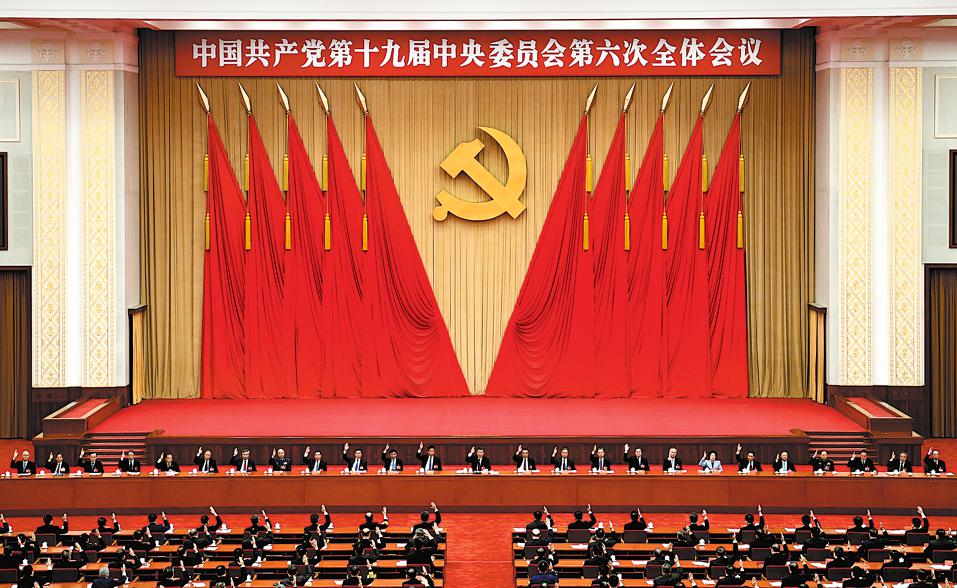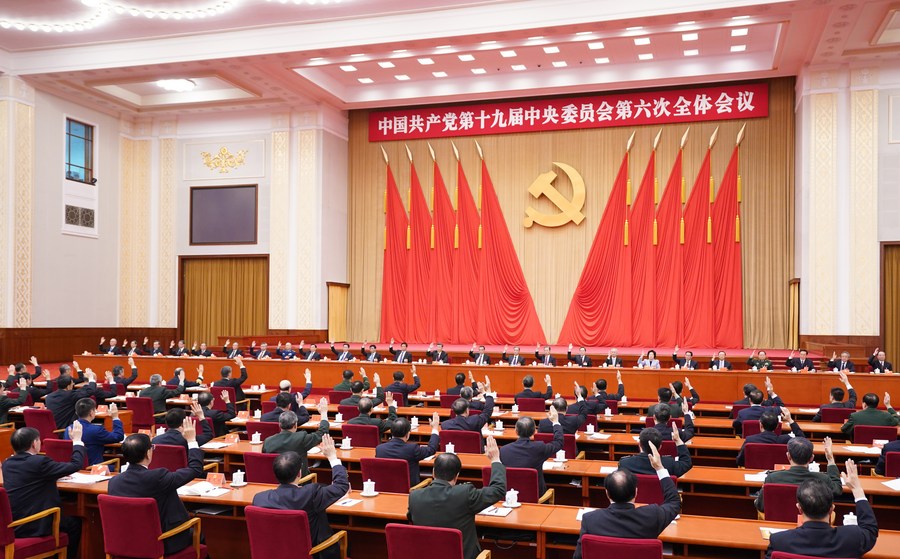The 19th Central Committee of the Communist Party of China convenes its sixth plenary session in Beijing. [Photo/Xinhua]
An overwhelming victory has been achieved in the fight against corruption, and this momentum has been consolidated across the board, according to a landmark resolution of the Communist Party of China.
The Resolution of the CPC Central Committee on the Major Achievements and Historical Experience of the Party over the Past Century was released on Tuesday. It was adopted at the sixth plenary session of the 19th CPC Central Committee, held from Nov 8 to 11.
The resolution said that by taking resolute action since the 18th National Congress, the Party has given full play to the role of full and strict Party self-governance in providing political guidance and guarantees.
The Party's ability to improve and reform itself and maintain its integrity has been significantly strengthened, and the problem of lax and weak governance over Party organizations at the fundamental level has been addressed, the resolution said.
"As serious potential dangers in the Party, the country, and the military have been rooted out, our Party has grown stronger through revolutionary tempering," it said.
At a meeting held by the CPC Central Commission for Discipline Inspection on Nov 12 to study the guiding principles of the Party's plenary session, Zhao Leji, the top anti-graft official, called on disciplinary organs across the nation to contribute to the Party's self-revolution in the new era.
Resolute efforts should be made to carry on the battle against corruption and consolidate the achievements in the Party history learning campaign, he said.
Hu Jianmiao, a law professor at the Party School of the Central Committee of the Communist Party of China (National Academy of Governance), said remarkable achievements have been made in promoting the full and strict governance over the Party and the fight against corruption since the Party's 18th National Congress in 2012.
Advancing governance
Between December 2012 and May this year, disciplinary inspection and supervisory bodies investigated 392 officials at or above the provincial or ministerial level and 22,000 at the bureau level suspected of bribery, according to data from the CCDI.
Since the 2014 launch of the Sky Net anti-corruption operation, 9,165 fugitives, including 2,408 Party members and government staff, have been brought back from 120 countries and regions, and 21.74 billion yuan ($3.4 billion) in embezzled funds has been recovered, data showed.
A survey conducted by the National Bureau of Statistics at the end of last year showed that 95.8 percent of people are confident in the enforcement of strict Party governance and the curbing of corruption, a 16.5 percent increase over the 2012 survey conducted before the 18th CPC National Congress.
"Any act of corruption is against the rule of law," Hu said, adding that the fight against corruption and the advancement of law-based governance are highly consistent, and tackling corruption is both an important task and a requirement for advancing the rule of law.
The Political Bureau of the CPC Central Committee presides over the sixth plenary session of the 19th CPC Central Committee in Beijing. [Photo/Xinhua]
Wang Xigen, dean of the school of law at Huazhong University of Science and Technology in Wuhan, Hubei province, said the key element of the rule of law is to restrict public power.
"If leading officials who hold the power of the country are not properly monitored, it will inevitably lead to abuse of power," he said.
"To comprehensively advance the rule of law, efforts should be stepped up in fighting corruption to form a legal system to ensure that people dare not, cannot and do not want to commit corruption," he added.
At the first central conference on work related to overall law-based governance in November last year, General Secretary of the CPC Central Committee Xi Jinping underlined the crucial responsibility that leading officials have to promote law-based governance in the country.
At the meeting, which also marked the establishment of Xi Jinping Thought on the Rule of Law, he stressed that leading officials at various levels must faithfully implement major decisions and plans made by the CPC Central Committee on law-based governance.
Xi called for leading officials, known as the "critical minority of top cadres", to improve their abilities to use law-based thinking and approaches to carry out reform, promote development, resolve problems and maintain stability.
He urged officials to set a good example in upholding the law, treating it with respect and mastering it.
Hu said that leading officials, though small in number, exercise the ruling power of the Party and the legislative, administrative, supervisory and judicial bodies of the State.
"They have certain decision-making power in various fields of national governance, and the correctness of their decisions will directly determine the results of national governance," Hu said.
Wang said that officials' lack of legal consideration could bring more harm, including corruption.
"The biggest harm (from this carelessness) is that it undermines the dignity and authority of the law, undermines the Party's leadership over law-based governance, and infringes on the rights of the people," he said.
Hu said China's leading officials at all levels have become more conscious about observing the law and studying and applying it, and an atmosphere is emerging in which they will take the lead in respecting, believing in and mastering the rule of law.
However, there are still some officials who do not take legal consideration seriously enough, he said, adding that some officials are only pretending to believe in the rule of law.
Wang said China has formulated and implemented laws and regulations to strengthen the legal responsibilities of leading officials in pushing forward the rule of law, and to establish a strict accountability mechanism to ensure that their responsibilities are effectively implemented.
In 2014, the CPC Central Committee released a document concerning major issues in advancing law-based governance. It made clear for the first time that leading responsible people in the Party and government must bear the duty of being the most responsible for rule of law construction.
In 2016, a document was issued that clearly stipulates the responsibilities that Party and government leaders should perform in promoting the rule of law.
Wang said many practical measures have been put in place, including the establishment of a legal adviser system to provide support for the government in making decisions and promoting law-based administration, and the inclusion of officials' efforts in promoting the rule of law in their performance evaluations and job promotions.

